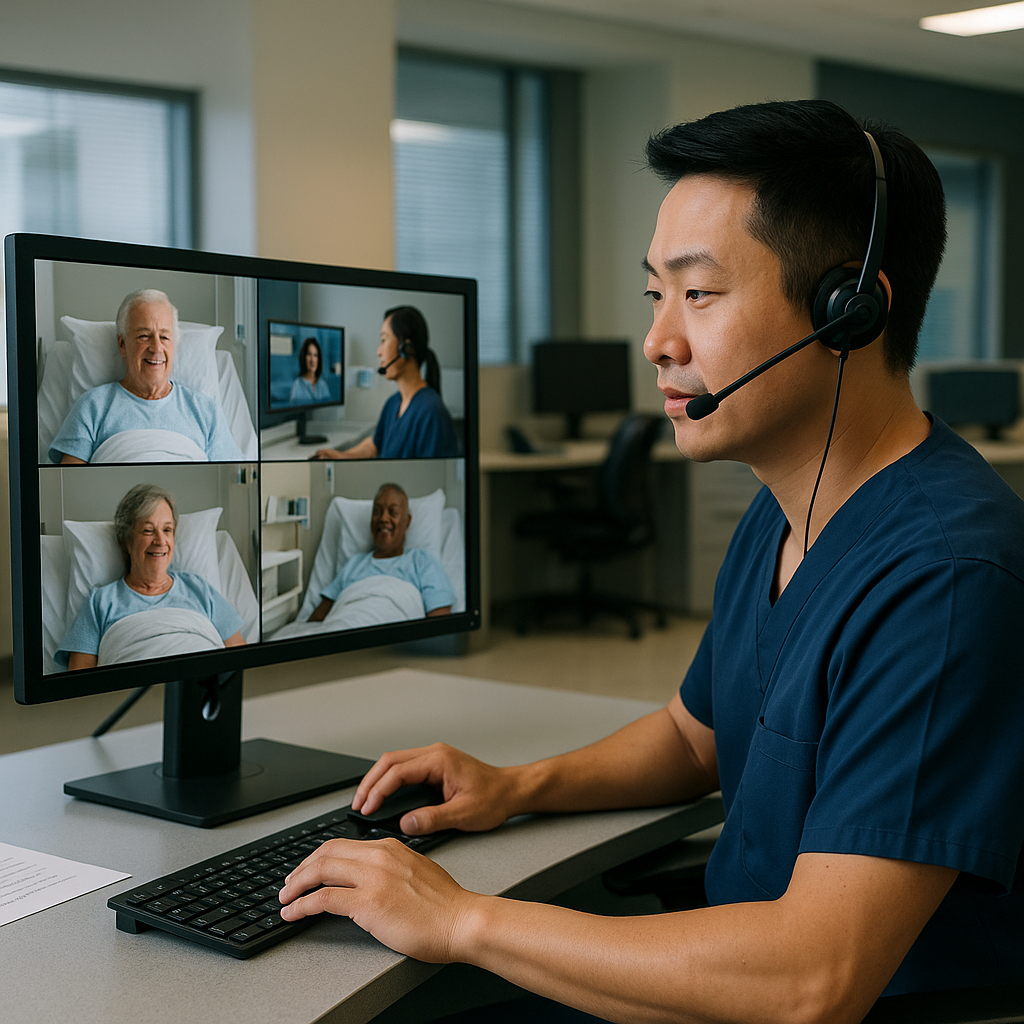Enhancing Care Delivery: The Trend of Virtual Nursing
The ongoing nursing shortage, intensified by the challenges brought on by the pandemic, has pushed healthcare facilities to explore innovative...

Last updated Nov 11, 2025
Discover how virtual nursing care and remote sitters are revolutionizing healthcare amidst a global nursing shortage.
The global nursing shortage is a pressing issue that has been exacerbated by the increasing demand for healthcare services. Virtual nursing care offers a viable solution to this problem by enabling nurses to provide care remotely. This approach allows healthcare facilities to optimize their workforce, ensuring that patients receive timely and efficient care even when there are fewer nurses available on-site.
By leveraging virtual care solutions, healthcare providers can extend their reach and improve patient outcomes. Remote consultations, virtual check-ins, and telehealth services enable nurses to monitor and support patients without the need for physical presence. This not only addresses the shortage but also reduces nurse burnout by distributing the workload more evenly across the healthcare system.
Remote sitters are a critical component of virtual nursing care that enhances patient safety and monitoring. By using advanced video and audio technologies, nurses can remotely observe and interact with patients, ensuring their well-being and addressing any immediate needs. This approach is particularly beneficial for patients who require continuous monitoring, such fall risks or those with chronic conditions or those recovering from surgery.
Remote sitters reduce the risk of falls, medication errors, and other adverse events by providing constant oversight. This also allows for quicker response times in emergencies, as nurses can immediately alert on-site staff if a patient requires urgent attention. Additionally, remote virtual sitters can reduce the need for physical restraints, promoting a more humane and compassionate approach to patient care.
Smart TV technology plays a pivotal role in the effectiveness of virtual nursing care. These devices can be integrated with electronic health systems to provide patients with access to virtual consultations, educational resources, and real-time monitoring. Smart TVs offer a user-friendly interface that makes it easier for patients to engage with their care plans and communicate with their healthcare providers.
Moreover, patients expect these smart technologies. Smart TVs can be equipped with various health apps and tools that enable remote monitoring of vital signs, medication adherence, and other health metrics. This seamless integration of technology ensures that patients receive comprehensive care without the need for multiple devices, streamlining communication workflows and enhancing the overall patient experience.
The future of virtual nursing is promising, with ongoing advancements in technology and a growing acceptance of remote care models. Innovations such as artificial intelligence, machine learning, and advanced wearable devices are expected to further enhance the capabilities of virtual nursing. These technologies will enable more accurate diagnostics, personalized care plans, and predictive analytics to anticipate patient needs.
Additionally, as healthcare systems continue to adapt to the challenges posed by the nursing shortage, we can expect to see increased investment in virtual care infrastructure. Policies and regulations will likely evolve to support the integration of these technologies into mainstream healthcare, ensuring that virtual nursing and remote sitters become standard practices in delivering high-quality patient care.

The ongoing nursing shortage, intensified by the challenges brought on by the pandemic, has pushed healthcare facilities to explore innovative...

Quick Preview Checklist https://magnetpathwaycon.nursingworld.org/ Event Dates: October 8 - 10, 2025 Location: Georgia World Congress Center,...

Consistency can make or break a patient’s experience in healthcare. As part of receiving high-quality care, patients are typically seen by multiple...